- Home
- Garth Stein
A Sudden Light Page 6
A Sudden Light Read online
Page 6
I went downstairs in search of my father. In the kitchen, I found a note from Serena encouraging me, once again, to make myself at home, though I didn’t feel I would ever, really, feel at home in Riddell House. I didn’t even know what time it was, since I had misplaced my watch somewhere between chasing a dancing ghost and waking up in the morning, and there was no clock in the kitchen. I skipped breakfast and went outside.
My father wasn’t in the meadow, so I ventured into the courtyard behind the house. The front of Riddell House faced westward to Puget Sound and the Olympic Mountains, and had a majestic, sweeping facade; the rear of Riddell House was something different: a formal garden, which must have been impressive at one time, had deteriorated into something better suited to a haunted house. Broken stone paths were overgrown with clover. An impressive fountain, cleaved from a great slab of marble and standing taller than me, was stained with rust and appeared to have been a dedicated rainwater collector for decades. The box ferns were shaggy and overgrown, the flower beds were covered with moss and sword ferns, and the roses had grown so long and leggy they couldn’t keep themselves up but tipped their heads over to rest on the hard ground.
Behind the garden, down a path of pebbles and weeds, was a crumbling swimming pool; a foot of black and green sludge percolated in the deep end like tar. The tile walls, which surely were once beautifully patterned, were cracked and broken. The pool house had been long abandoned, and the door yawned open to the darkness inside. To the east of the pool was a patio with fluted urns sitting upon a sturdy balustrade that opened to a broad staircase stepping down to a clay tennis court with no net and broken standards and a cracked and brittle surface.
My father was still nowhere to be seen.
I circled around again to the meadow and spotted him out by the bluff. He glanced back at me when he heard my approaching footsteps, but other than that, he didn’t move, standing on the edge of the cliff looking down.
It was dramatic on the precipice. The drop was almost two hundred feet. The beach below was rocky and full of driftwood, entire trees bleached by the salt and the sun. At the base of the cliff were two sets of railroad tracks on a rocky berm that snaked off along the shoreline both north and south, bending as the landform undulated against the water.
“Elijah Riddell built those tracks,” my father said as I approached.
“I thought he was timber money,” I said, already feeling the sway of vertigo. It wasn’t that I didn’t like heights, it was that I didn’t like falling from those heights and dying.
“Timber and railroad companies were intertwined. It was a very insider world. You must have learned about Teddy Roosevelt and trust-busting and all that in American history. The government gave land grants to the railroads, the railroads made deals with the timber barons to harvest the trees, the timber barons sold off mining rights to the precious metal concerns—”
“Precious metals?” I asked. “Here?”
“Broaden your scope. The Northwest used to be considered anything west of Chicago. They found a lot of silver in the panhandle of Idaho. Sapphires in Montana. But the big money was in copper.”
“Why not gold?”
“The telegraph. Suddenly everyone needed copper wire. And it’s horrible stuff to mine. It abuses the body.”
“Ah,” I said, impressed by my father’s knowledge of the arcane.
“Anyway, Elijah was in all of it. He had a piece of everything. Your great-great-grandfather supplied all those railroad ties down there, every single one of them. Have you heard the horns from the trains when they pass?”
“No.”
“Now that I’ve pointed it out, you will. When the trains pass, they always blast their horns in salute to Elijah Riddell.”
“Really? He died a long time ago.”
“That’s the thing about tradition,” he said. “People don’t really need to know how it got there; they do it anyway.”
“Sounds like religion.”
We paused for a moment, and I didn’t break the spell. For my entire life, I’d wanted to bond with my father; that we were finally doing it on the edge of a cliff seemed somehow foreboding, but it was a step in the right direction.
“I lost my wedding ring,” my father said after a time, feeling the ring finger on his left hand. “Is that some kind of a sign? The crumbling of my marriage?”
“Did you look under your dresser?” I asked.
“I looked everywhere. It’s gone.”
I thought for a moment. My watch was missing. Could they be connected?
“Grandpa Samuel hears Isobel dancing at night. In the ballroom.”
My father responded only by nodding his head.
“She’s dead,” I added. “She can’t really dance.”
“Grandpa Samuel hears things,” my father said. “It’s part of his dementia.”
“Sure,” I agreed. “But . . . I heard it, too. And I don’t have dementia.”
“When did you hear it?”
“Last night. And I saw someone in the ballroom, but I’m not sure I really did. Maybe it was nobody.”
“But you’re not sure.”
“And I can’t find my watch. I put it on my dresser last night. Now it’s gone.”
“So you’re suggesting . . . ?”
I stared him down, and then I ticked off the mysteries on my fingers.
“A lost wedding ring, a missing watch, a spirit in a hidden stairway, dancing footsteps, and a man in the wall calling my name. At least, I think. Maybe it was a dream. You brought me to Weirdville so we could tear down the house. But we can’t tear down the house because the man who owns the house thinks his dead wife still lives here. Dad. I think it’s time for us to have the talk.”
“The talk.”
“The one you had every night around the dinner table when you were my age. States of being. Spirits. Ghosts. The nomenclature. It’s time.”
“Ah, yes,” my father said, nodding deliberately and scratching the ground with his foot. “So, Trevor. I have to confess something. My mother was a flake.”
“Crazy?”
“A New Age flake. She was a flower child. She sat in a pyramid to gather energy.”
“A pyramid?”
“It was a frame,” he said. “Made of metal. A pyramid, I don’t know, four feet or so tall, and, you know, yay big. She sat inside it. See, you don’t understand. Look, the belief is that our journey in our earthly bodies is just that—part of our journey. We come here for a while to hang out and touch things and eat things and listen to music and, you know, jack off—”
“Come on, Dad.”
“You know,” he said, “make love. Indulge in the physicality of our world. So—and this is how my mother would tell it, and she wasn’t a trained psychic or anything, she was ‘in-tune’—she said that after we die and our soul enters the nonphysical dimension, we can interact with the physical world if we focus on it, and we can come back and visit whenever we want. We can always drop by and say hello. And sometimes a person will see one of these visits. Well, that’s not really a ghost. That’s a spirit. That’s like a flyby. Football players get this a lot. ‘I felt my dead father was with me,’ they say when they score a touchdown. Well, their dead father was with them. But then, there’s another kind of thing.”
“A ghost,” I said.
“A ghost. Exactly. A ghost is a soul that’s stuck. Someone who didn’t finish something or has some lingering need and is stuck in this world. My mother would say: A spirit can come and go anytime she wishes, but a ghost is stuck, because a ghost doesn’t see the door.”
“The door,” I repeated.
“To the nonphysical dimension,” he said. “That’s why our nomenclature has to be correct. Does Riddell House have spirits, or does it have ghosts? There is a difference. But don’t take it all seriously. My mother sat under pyramids, and she used a pendulum to decide whether or not she should give her kids cough medicine, or to see if I could eat strawberries without breaking
out in hives.”
“What?”
“Pendulum testing. Don’t worry about that part.”
“You don’t believe it,” I said.
“No. No, I don’t think so.”
“And you don’t believe in ghosts.”
“No,” he said. “I don’t think so.”
“But you did when you were my age?”
He looked at me long and hard.
“Yes, I did,” he said. “If you want me to be perfectly honest.”
I wanted him to be perfectly honest, so I held his look as long as I could.
“Why did you lose your faith?” I asked.
He looked away, dug at the ground again, shrugged dramatically.
“Why does the cock crow?” he said. “Don’t ask him, he doesn’t know.”
I rolled my eyes at my father’s ridiculous aphorism, a repetition of what Serena had said the previous night.
“My mother used to say that,” he said, swiping back at my contempt, and then he started back to Riddell House.
“Who does know?” I asked after him. “If the cock doesn’t?”
“We have a mission,” he said plainly. “We’re here to get Grandpa into a home, sell this place to an experienced residential developer in a lucrative real estate transaction, and get out. In and out commando-style.”
“So you can get back together with Mom,” I confirmed.
“So I have a chance of getting back together with Mom,” he clarified. “So let’s keep our eyes on the prize, buddy. Your cooperation in this endeavor will be greatly appreciated. Thanks in advance for your understanding.”
He headed off across the meadow.
Frustrated by my father’s Vulcan-like air of disinterest, I called after him: “Hey, Dad, repeat after me: ‘Primary objective: getting back together with my wife—’ ”
He kept walking.
“ ‘So my son doesn’t hate me for the rest of his life,’ ” I finished.
He stopped dead in his tracks, hesitated a moment, and then turned to face me.
“There’s a long line of people who will hate me for the rest of their lives,” he said. “I will do everything I possibly can—everything in all of my power—to make sure you are not in that line, Trevor. I hope you know that.”
I shrugged.
“Well,” he said. “As your mother would say, the proof is in the pudding. We’ll see if I earn it, okay? I admire you for your persistence. I suppose, if I had approached my father in the same way, things might have turned out differently.”
“What about what your mother would say?” I asked. “The pendulum thing she did—curing your colds and checking you for strawberry allergies. Did it work?”
He thought for a moment.
“Yes,” he said. “I suppose it did.”
I nodded significantly.
“No further questions,” I said. “The witness may step down.”
– 7 –
THE BOOK OF JONES
In 1967, my grandmother Isobel Jones Riddell died, after which my father, Jones Riddell, was sent away to a boarding school in Connecticut. He did not return home to Riddell House for twenty-three years. The boarding school was not far from where I grew up, before my parents lost everything and we became, for all intents and purposes, homeless. I knew the school. It was called Mount Sovern Academy, and it had a reputation for taking students who didn’t fit into a “traditional academic environment.” In other words, they took the fringe and the dregs and stored them until they were eighteen and legally allowed to terrorize society without the need of a guardian. The antisocial, the asocial, the pathological, the violent, the drug-induced hysterical, the cruel, and the good old-fashioned whack-bot crazies. Basically, when the judge said, “It’s either Mount Sovern or a penal colony off the coast of Venezuela,” the smart kids chose Venezuela. The rest were dumped at Mount Sovern.
My father attended Mount Sovern for two years, graduated, and joined the workforce. There was a local boatbuilder nearby who had a kind heart and paid him minimum wage. My father proved his worth sweeping floors for a few months, and, soon, he was brought into the fold. He was taught the trade of traditional wooden boat building. Apparently, he was pretty good at it. When he met my mother, he had already achieved a good measure of success, but she inspired him to go even farther. I was too young to remember any of this, but the story goes that, when I was a little kid, word of my father’s gift with wood had spread across the Atlantic seaboard, and the volume of work thrust upon him earned him enough money that he could afford to buy a little farmhouse that reminded my mother of her childhood in England. We had a modest apple orchard and a creek on the far edge of the property, which edged up to a little forest where I roamed and played and learned to climb a tree. And then, after my father had set out on his own and established his own business, in a generous act of civic responsibility, he offered an internship to Mount Sovern Academy so that a student could learn the craft of wooden boat building.
The program was quite successful; the first student went on to apprentice as a carpenter and, later, get his union certification.
“Rah, rah, rah!” the community cheered.
The school asked my father if he would do it again. The next term, he took two kids. Also very successful. The school wondered if my father would offer a summer program for kids who really couldn’t go home because if they went home they would probably fall victim to the overwhelming temptation to slit open the throats of their sleeping parents.
My father said, “Sure thing!”
Eight kids lived at Mount Sovern that summer and were bused to my father’s workshop every day. He taught them how to sail. They went hiking together sometimes, swimming; they played Wiffle ball. (All things my father never had time to do with me.) They built a boat together. A beautiful skiff with lapstraking. Everyone was impressed. A local community patron paid way too much money for the boat at a fund-raising auction. And, after the last day of camp, one of the kids snuck out of Mount Sovern after midnight, walked eight miles or so to my father’s boat workshop, and burned the building down to the ground. Entirely. Literally nothing left but wisps of smoke.
How’s that for a story?
Insurance covered the loss. The school apologized profusely for the security lapse—after all, how do you promote goodwill with the locals if your delinquent residential students are running around the neighborhood burning down businesses? And the kid was sent straight to the penal colony off the coast of Venezuela. But something happened to my father after that event. He changed. He became fixated on helping the kids at Mount Sovern Academy. He never told me why. But I might suggest that, as a graduate of Mount Sovern, my father had found his salvation in wooden boat building; perhaps he wanted to pass on this redemptive trade to others. If he could save a kid by teaching him how to do something constructive with wood, wouldn’t that be enough? After all, our family had made a fortune by destroying the forests. Shouldn’t someone benefit by creating something positive from the fallen corpses?
My father dutifully rebuilt his workshop, but he stopped taking orders for new boats. From then on, he pretty much only ran semester-long workshops for Mount Sovern boys. In each semester, and at a camp over the summer, they built a skiff. They’d build one, and then auction it off to raise money. Build one, sell one. Build one, sell one.
Each time they finished a boat, a local patron would step up and pay too much for it and my father would get enough money to pay his bills. But babies and puppies are only cute for a little while. Then they become what they’re going to be for the rest of their lives: people and dogs. And people will overpay for a baby or a puppy. They won’t overpay for an old dog.
I don’t have a business degree. I’ve never even run a lemonade stand. I know nothing about economics. But even I know: Selling three skiffs a year will lead to bankruptcy!
Surely, I exaggerate. I was a kid when this was going on; I saw only my own limited perspective. I have no doubt there wa
s more subtlety to the decline of my father’s business. Poorly negotiated leases, a slumping economy, the skyrocketing cost of exotic hardwoods from Indonesia, his insistence on building boats from scratch and not dabbling in restoration or repairs. But when a business is on the rocks, it only takes a couple of careless missteps to dash it to bits. And so, it was dashed.
I have no doubt this sequence of events is why I spent all of my time as a child reading books. (My mother kept so many books in our little farmhouse, stacked on everything, piled everywhere—they were impossible to avoid!) With a book—presuming it’s a good book—you can depend upon an outcome that adheres to the necessities of drama. The question will be answered. It has to be. The answer may not be happy; we can’t guarantee a comedy. Sometimes tragedy strikes. But there will be a conclusion. Of that we can be sure. That’s the whole point of a book.
But in real life, there is no guarantee that any question will ever be answered. Real life is messy because we don’t know where it’s going to go. And, really, there’s no end in sight. Except death. And it wasn’t clear to me back when I was fourteen, considering my initial experiences in Riddell House, that death was the end it had always been made out to be.
It still isn’t clear to me now.
– 8 –
INNOCENCE LOST
Before dinner that evening—only our second day at Riddell House, but it felt like so much had happened since we’d arrived—I ventured out to the porch in search of Grandpa Samuel, who, I hoped, would be having his lemonade in the sun. I wanted to question him. Glean insight from his half answers. I wasn’t even sure what he could possibly tell me, but I had to find some way to help my father become whole again so he could get back together with my mother.
I was hugely disappointed to find that my father had already taken my place on the blazing veranda. He was sitting on my chair. He was drinking my lemonade. He was talking to my grandfather.

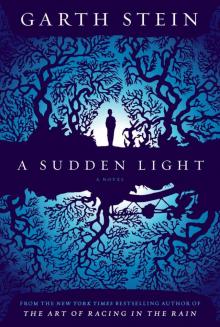 A Sudden Light
A Sudden Light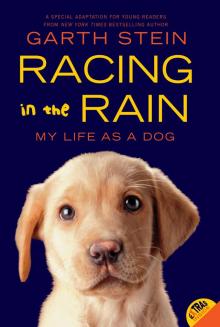 The Art of Racing in the Rain
The Art of Racing in the Rain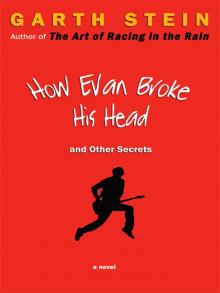 How Evan Broke His Head and Other Secrets
How Evan Broke His Head and Other Secrets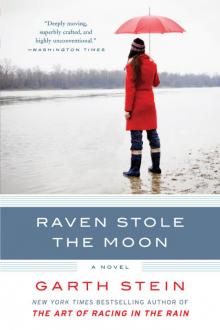 Raven Stole the Moon
Raven Stole the Moon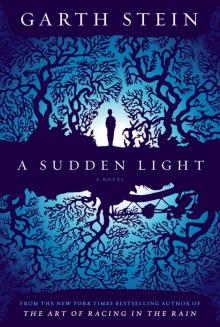 A Sudden Light: A Novel
A Sudden Light: A Novel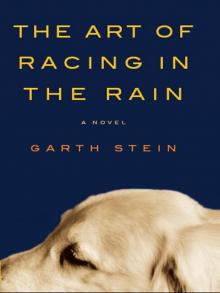 Art of Racing in the Rain, The
Art of Racing in the Rain, The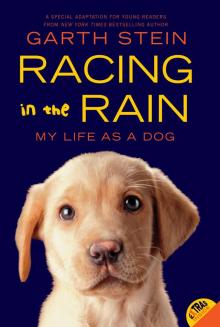 Racing in the Rain
Racing in the Rain